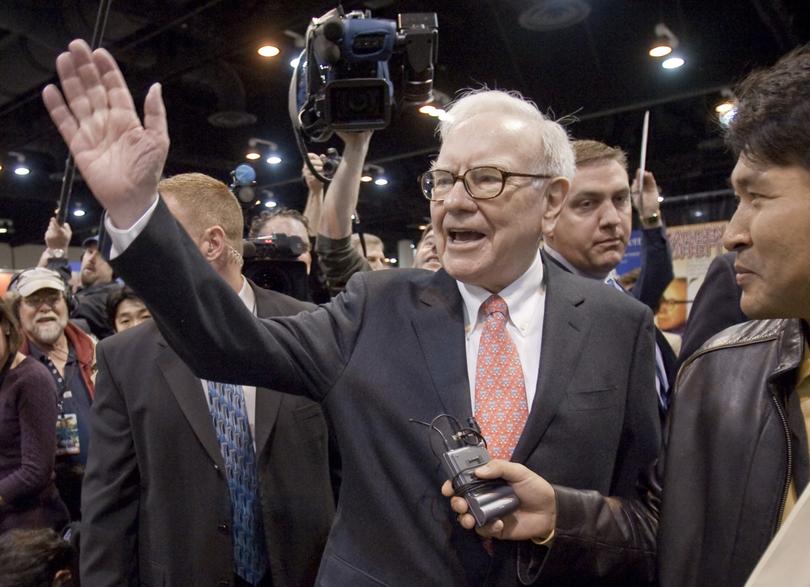Warren Buffett: Understanding Berkshire Hathaway’s sudden $227 billion cash accumulation
No investor commands attention quite like Warren Buffett.
As boss of Berkshire Hathaway, an investment firm he has run for almost six decades, Mr Buffett’s every movement is scrutinised. When he shifts in his seat, investors large and small ponder what it might mean for their portfolios.
Results released by Berkshire Hathaway on August 3 gave watchers more reason than normal to take note.
Sign up to The Nightly's newsletters.
Get the first look at the digital newspaper, curated daily stories and breaking headlines delivered to your inbox.
By continuing you agree to our Terms and Privacy Policy.The company announced it had cut its stake in Apple by almost half, to $84 billion.
Its holdings of cash and Treasury bills increased from $189b in the first quarter of the year to $277b at the end of June.
The backdrop to the announcement was dismal. Stockmarkets were in the midst of a sell-off, after weaker-than-expected data on US employment had provoked worries about the strength of the world’s largest economy.
Mr Buffett’s reputation has taken on an almost spiritual element: he is known as the “Oracle of Omaha” for a reason.
The tens of thousands of investors who flock to Berkshire Hathaway’s shareholder meeting are more disciples than stockpickers. It is no surprise, then, that some onlookers see the cash accumulation as a dark omen.
They note that Mr Buffett also accumulated cash in the mid-2000s, before the global financial crisis, leaving him in a strong position to buy when other investors’ balance-sheets were hammered. What does he know about the economy that they do not?
Less than they imagine.
Mr Buffett’s extraordinary talent as an investor is not based on a capacity for seeing the future. Indeed, his outperformance is all the more impressive for his lack of supernatural abilities.

In research published in 2018, Andrea Frazzini, David Kabiller and Lasse Pedersen, all of AQR Capital Management, a quantitative investment firm, found that Mr Buffett’s long-run outperformance can be straightforwardly explained.
He has bought high-quality stocks at relatively cheap prices, and applied leverage judiciously. His strategy is, in short, classic “value investing”, albeit a form that is combined with the ability to borrow cheaply through Berkshire Hathaway’s insurance business.
Just as the explanation for his extraordinary performance is acumen rather than magic, so is the reason for Mr Buffett’s cash build-up. In May Mr Buffett said his investors should expect him to sell shares and build up reserves for two reasons.
One is that he expects taxes on capital gains to rise, and wants to realise his profits before that happens. The other is that he sees few cheap, high-quality companies in which to invest. The stockmarket is expensive across the board.
Berkshire Hathaway’s investments in Japan are an example of both the merits and the limits of Mr Buffett’s strategy. It appears unlikely that the firm would have sold the stakes it holds in five sogo shosha, cheaply valued trading houses, during the recent bout of market turmoil.
In February Mr Buffett mentioned the investments as among those he expected to hold indefinitely. At the same time, he has promised his stakes in the companies will not exceed 10 per cent, a figure his holdings already bump up against.
Therefore options for expansion — either at home or abroad — remain scant.
Mr Buffett has never claimed to posses the foresight his followers attribute to him. Indeed, he once joked that any firm which hires an economist has one employee too many, and says he has never made any investment decision based on an economic prediction.
Although Berkshire Hathaway emerged from the global financial crisis in better shape than the vast majority of its peers, the company’s cash holdings declined as a share of its total assets in the quarters running up to the collapse of Lehman Brothers in 2008 — not the path an omniscient investor would have taken.
Mr Buffett’s new cash pile is undoubtedly enormous.
Berkshire Hathaway could, if it wished, buy McDonald’s at the burger chain’s current share price and have $80b left over, or take a stake in Meta larger than the one held by Mark Zuckerberg, the firm’s boss.
If markets do enter a steeper downturn, Mr Buffett will be in an enviable position, able to snap up firms trading at discounts.
Fans of Mr Buffett’s clear-headed approach to investing should nevertheless take him at his word.
His simple maxims are at the root of his long and impressive performance as an investor; his growing cash pile holds no hidden explanation.
The value investing Mr Buffett practises has become increasingly tough.
In the absence of a much more protracted sell-off, it is likely to remain so.
